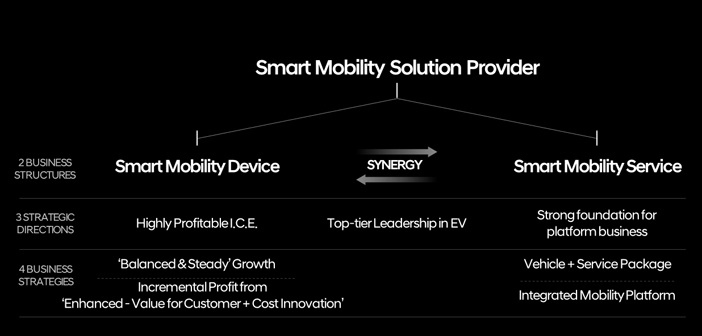Hyundai Motor Company has announced a roadmap to secure its position as a frontrunner in the future mobility industry.
Under the new roadmap, named Strategy 2025, the company will foster Smart Mobility Device and Smart Mobility Service as two core business pillars; the synergy between the two is expected to facilitate the company’s transition into a smart mobility solution provider.
The Smart Mobility Device business will supply products optimized for the services and lay the groundwork to help foster the service business. Meanwhile the Smart Mobility Service business will provide personalized contents and services on the devices to help secure a broader customer base.
Hyundai’s plans for Smart Mobility Device include a wide range of product groups beyond cars, such as personal air vehicles (PAVs), robotics, and last-mile mobility. Hyundai will reinforce its manufacturing capabilities to build products that offer customers “a seamless mobility experience”. Hyundai aims to secure leadership in electrification by selling 670,000 electric vehicles annually and become one of the world’s top three manufacturers of battery and fuel cell EVs by 2025.
Hyundai says that quality innovations will maximize customer value based on three smart elements: innovative digital user experience (UX), artificial intelligence-based (AI) connected services, and safety-first autonomous driving. For the latter, SAE Level 2 and 3, as well as ADAS for parking, will be available in all models by 2025, alongside the company’s aim to develop a fully autonomous driving platform by 2022 and begin mass production by 2024. Hyundai’s plan to offer differentiated vehicle features to customers is expected to reduce incentive spending and improve customer perception of the brand.
Smart Mobility Service is a new area of business for Hyundai. Services and contents will be personalized and offered through an integrated platform to maximize value for customers, says the company. The company will build an integrated mobility platform that analyzes data from in and around the vehicle through car connectivity. Through an enhanced understanding of customers, it intends to offer services tailored to the needs of customers in every aspect of their lives, including shopping, delivery, streaming, and multi-modal mobility services.
Strategy 2025 also details regional optimization for Smart Mobility Service. In the USA, carsharing and robotaxi service demonstrations will capitalize on the anticipated commercialization of autonomous vehicles of SAE Level 4 or higher. In Korea, Asia and Australia, Hyundai plans to enter the mobility service market by partnering with leading local players. In Europe and Russia, where the service industry is mature, the company will first focus on businesses that combine products and services.
Hyundai will earmark US$51bn of investment until 2025 for R&D and further exploration of future technologies. In the same timeframe, the company will target an operating margin of 8% in its automotive business and aim for a 5% share of the global vehicle market, up 1% from roughly 4% achieved in 2018.
“The key to our future strategy is to focus on customers and to present the most desirable products and services,” said company president and CEO Wonhee Lee. “We want to offer smart mobility experiences that meet the shifting needs of our customers by leveraging advanced technology. Transforming into a smart mobility solution provider with comprehensive mobility solutions that combine devices and services will be the centerpiece of Hyundai’s future strategy.”


